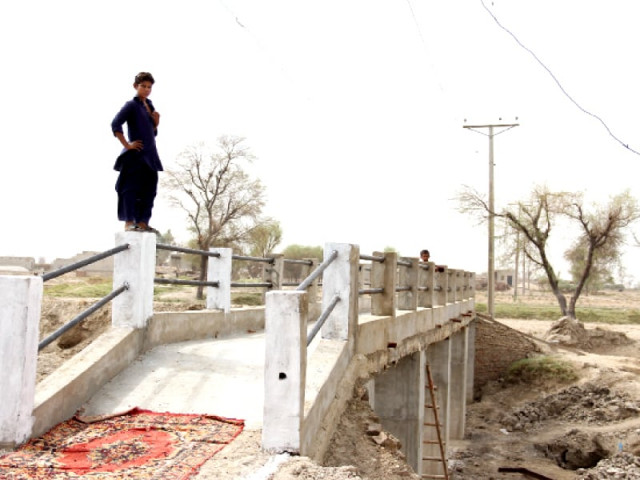For a village in Sehwan, new ‘pul’ ends a partition
The IRC helps villagers build a bridge over a canal they had to swim across.

For a village in Sehwan, new ‘pul’ ends a partition
For the residents of Jogi Khan Rind village in Sehwan, their new bridge isn’t just a walkway or an accomplishment listed in a PowerPoint presentation. It represents security, an efficient travel route, security and access to basic needs such as health and education.
On Saturday morning, people gathered to look at the new ‘pul’ over a canal in this village in Sehwan’s UC Channa, built by the Indus Resource Centre (IRC). The IRC has quite literally bridged a gap that existed in Jogi Khan Rind, as there was no proper way to cross over the waterway. People either teetered over a mud walkthrough, or had to go around and cross several other villages just to be able to access the Sehwan-Dadu main road.
“This is a work of sawaab,” said Gul Hassan. “Before, people would have to tie a clay pot to their stomachs and swim across. It was very difficult to transport people to the hospital, or to take the dead to the graveyard, which is on the other side of the canal.”
Other locals said there were problems with security, including enmities with residents of the villages they had to cross to make their way to the main road.
Farzana Buriro, IRC’s district coordinator for Jamshoro, said the need for the bridge had been identified when the organisation began working in the district during the 2010 floods. “Water flows from Manchar into the Danestar canal, and then into the river. What happened during the floods is that there was flooding along the same route that people were using to escape,” Buriro told The Express Tribune.
Though IRC does not generally work on building bridges, the incessant demand compelled them to look into one. It took 25 working days to build the bridge, with 145 men who worked as a cash-for-work unskilled labour, and 50 men as skilled labour. The bridge cost Rs699,753. Mohammad Aslam said the old route was ‘full of problems’. “The bridge will cut down travel time from an hour to 30 minutes,” he said, as men standing nearby nodded in agreement.
“This will really help people,” another man piped up. Young children skipped over the new bridge, which the men of Jogi Khan Rind helped put together. It may not have the sheen of government-built bridges, but it serves a purpose that the government has not been able to adequately meet, though villagers said similar bridges are in the pipeline in other areas in Sehwan tehsil.
At 8am, men were spread out on the route to the bridge, holding Pakistan Peoples Party (PPP) flags and bags of flower petals to shower on the guest of honour at the event unveiling the bridge: Sindh Finance Minister Murad Ali Shah, the elected representative from the constituency.
In some ways, the trademarks of a big-shot politician visiting his constituency were present: Shah’s supporters chanted ‘Jiye Bhutto’, his police escort lifted themselves out the window to be captured by the waiting cameras, and Shah was in trademark politico garb, a white shalwar kameez.
But in perhaps a sign of how constituencies across Sindh have been changing, the event was uncharacteristically held on time. Some men pointed to the empty chairs prior to his arrival, noting that perhaps some of their friends hadn’t shown up because “ministers only arrive at 11 am or noon!”
On the event’s agenda was also a tableau by students from the IRC’s House of Learning school in Khanote. And the production was a biting indictment of the problems plaguing Sindh - forced marriages, unemployment, lack of water and education. The more thin-skinned of politicos might have chafed at the themes but they resonated with the audience, who loudly cheered along when the young female actors mentioned water. Shah, accompanied by PPP’s Sindh General Secretary Taj Haider, echoed many of the talking points the PPP leadership has had over the past couple of years: Sindh was deluged, we did step up to help, there were mistakes made but there has also been progress, as evidenced by the development work being done in the area. But even though Shah enjoys support in Sehwan and the PPP slogans still ring loud, his constituents turned his speech into a Q&A session: what of water, they asked? He promised that at the very least, he would get started on providing drinking water as soon as possible. Shah – as he does in his speeches in the Sindh Assembly - seemed in touch with the issues of his area, even if finances aren’t always flowing in to resolve them.
The PPP’s loyalist jiyalas are often stereotyped as following the party blindly or voting for the ghosts of Zulfikar Ali and Benazir Bhutto, but the jiyalas at the IRC event know how to channel their loyalty into legitimate demands.
While Shah criticised some non-governmental organisations for turning the “suffering of people into a business” he appreciated the IRC for its work in Sindh in the past couple of years, as well as building the bridge. “The government cannot go through such disasters alone,” he said.
IRC’s Executive Director Sadiqa Salahuddin also highlighted how they had made the process of building the bridge as transparent and accountable as possible by putting up posters in the area asking people to contact them if any IRC staff member asked them for money. Residents, she said, were always welcome to register a complaint.
Published in The Express Tribune, August 5th, 2012.



















COMMENTS
Comments are moderated and generally will be posted if they are on-topic and not abusive.
For more information, please see our Comments FAQ